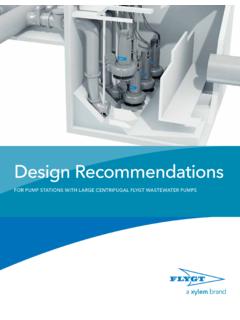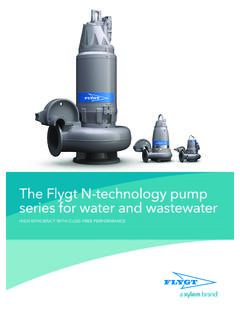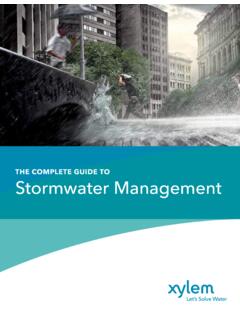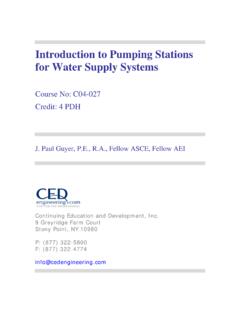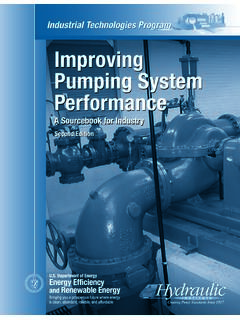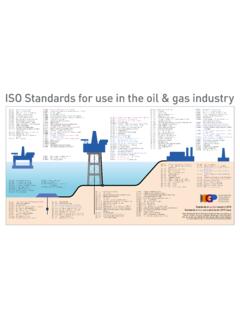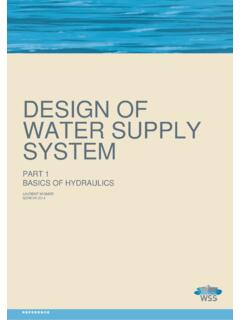Transcription of Design Recommendations - Xylem Inc.
1 Design RecommendationsFoR PumP StationS With LaRge CentRiF ugaL FLygt WaSteWateR PumPS23 This brochure is intended to help application engineers, designers, planners, and users of sewage and stormwater systems who are incorporating submerged submersible and dry installed Flygt pumps into their proper Design of the pump sump in such installations is crucial. Two important Design requirements to be met are: the prevention of significant quantities of air from reaching the impeller, and disposal of settled and floating solids. The Flygt standard pump sump can be used as it is, or with appropriate variations to meet the requirements of most pump and sump are parts of an overall system that also includes a variety of structures and other elements such as ventilation systems and handling equipment.
2 Operating costs can be reduced with the help of effective planning and suitable operation schedules. Xylem personnel and publications are available to offer guidance in these areas. Transient analysis such as air chamber dimensioning, valve selection, etc. should also be considered in wastewater pump station Design . These matters are not addressed in this brochure, but we can offer advice on these consult with our engineers to achieve optimum pump performance, maximum pump life, and a guarantee that product warranties are met. The Design Recommendations are only valid for Flygt products. Xylem assumes no lia bility for non- Xylem large centrifugal pumps introduction .. 4 General considerations for sump Design .
3 4 Xylem standard sump .. 5 Sump dimensions .. 8 Required sump volume .. 10 Minimum stop levels .. 10 Installation tips .. 12 Installation tips for submerged pumps .. 12 Installation tips for dry installed submersible pumps .. 12 Importance of duty point .. 14 Systems Engineering .. 15 Contents4 Flygt large centrifugal pumps introductionFlygt large centrifugal submersible pumps have been used in a variety of applications all over the world.
4 pumps can be either submerged or dry installed. Applications include wastewater pumping stations in a variety of sizes as well as intake stations to treatment plants, storm water pumping, irrigation, mine applications, shipyards, and submersible centrifugal pumps offer important advantages such as: A compact motor and pump unit No separate lubrication system Low operating sound level N impellers which provide sustained efficiency and enhanced reliability due to a unique hydraulic Design Flood proof pumping stations even for dry installed pumps Automatic connection and disconnection for submerged installations. This allows for fast and easy installation, inspection, and service. Minimal station superstructureOur submerged pumps are installed on a discharge connection bolted to the pit floor.
5 The pump is guided to its position with double permanently installed 3 pipes. The connection is automatic and needs no visibility. The pump is just lowered onto the discharge connection and is held in position by its own weight. Retrieval of the pump is just as dry installed pumps are easy to maintain. The motor and impeller assembly can easily be lifted out of the pump volute for overhaul and repair. The submersible pump/motor unit also provides the possibility of a flood proof pumping station for safe operation at all considerations for sump designIdeally, the flow of fluid into any pump should be uniform, steady, and free from swirl and entrained air. Lack of uniformity can cause a pump to operate at a lower efficiency.
6 Unsteady flow causes the load on the impeller to fluctuate, which can lead to noise, vibration, and bearing in the pump intake can cause a significant change in the operating conditions for a pump, and can produce changes in the flow capacity, power requirements, and efficiency. It can also result in local vortex-type pressure reductions that induce air cores extending into the pump. This, and any other air ingestion, can cause reductions in pump flow and fluctuations of impeller load which result in noise and vibration with consequent physical damage. Additionally, these fluctuations can impact process loads in other parts of the system. 5 The Design of a sump should not only provide proper approach flow to the pumps , it should also prevent the accumulation of sediments and surface scum in the sump.
7 The following points must be considered: Flow of water from the sump entrance should be directed toward the pump inlets in such a way that the flow reaches the inlets with a minimum of swirl and energy loss. In order to prevent the formation of air-entraining surface vortices in the sump, the walls must be designed and built to avoid stagnation regions in the flow. A properly placed wall close to the inlet can reduce the tendency toward localized swirl and vorticity. The water depth must also be great enough to suppress surface vortices. Although excessive turbulence or large eddies should be avoided, some turbulence does help to prevent the formation and growth of vortices. Sediment, which could be foul, must not accumulate within the sump.
8 Stagnant regions, or regions of such low velocity where sedimentation might occur, must be avoided. A sloping floor and fillets or benching often help to prevent sedimentation. For large variations in flow, part of the sump can be dedicated to low inflows with a lower floor level and a small pump. Consult Xylem for an optimum sump Design . Surface scum, floating sludge, and small debris can accumulate in any relatively calm region of the water surface, and this material must be pumped away. The water level should be lowered as much as possible at intervals to increase both velocity and turbulence, however, air should not be drawn into the pump. Please consult with an Xylem engineer in order to achieve optimum pumping performance.
9 The occasional increases in flow velocity will also assist in preventing the accumulation of sediment on the floor. Station inflow often approaches the wet well at a relatively high elevation. In such cases, the liquid may fall a significant distance as it enters the sump. Such a drop can also occur whenever the pumps have lowered the liquid level in the sump to the point at which all pumps are about to be switched off. Therefore, the path between the sump entrance and the pump inlets must be sufficiently long for the air to rise to the surface and escape before reaching the pumps . The energy of the falling water should be dissipated sufficiently so that excessively high and irregular velocities do not occur within the sump.
10 This can be accomplished with properly designed and correctly positioned baffle walls. The sump should be as small and as simple as feasible to minimize construction costs, however, a minimum sump volume may be specified for other reasons, such as to provide for a minimum retention time, or to ensure that only a certain number of pump starts per hour to be adopted in the Design of any sump are given in a number of Design guides or codes of practice for example, both the American Hydraulic Institute and the British Hydromechanics Research Association have published such guides. Nevertheless, whenever a new Design departs significantly from established configurations, model tests of the sump and its approaches should be standard sumpA sump designed in accordance with this brochure is smaller than a conventional sump.




